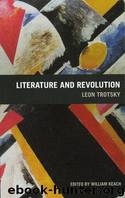Literature and Revolution by Trotsky Leon

Author:Trotsky, Leon [Trotsky, Leon]
Language: eng
Format: epub, mobi
Published: 2012-01-23T06:28:19.800000+00:00
Mayakovsky is a big, or, as Blok defines him, an enormous talent. He has the capacity of turning things which we have seen many times around in such a way that they seem new. He handles words and the dictionary like a bold master who works according to his own laws, regardless of whether his artisanship pleases or not. Many of his images and phrases and expressions have entered literature, and will remain in it for a long time, if not forever. He has his own construction, his own imaging, his own rhythm and his own rhyme.
Mayakovsky's artistic design is almost always significant, and sometimes grandiose. The poet gathers into his own circle war and revolution, heaven and hell. Mayakovsky is hostile to mysticism, to every kind of hypocrisy, to the exploitation of man by man; his sympathies are entirely on the side of the struggling proletariat. He does not claim to be the priest of art, at least, not a priest with principles; on the contrary, he is entirely ready to place his art at the service of the Revolution.
But even in this big talent, or, to be more correct, in the entire creative personality of Mayakovsky, there is no necessary correlation between its component parts; there is no equilibrium, not even a dynamic one. Mayakovsky shows the greatest weakness where a sense of proportion and a capacity for self-criticism are needed.
It was more natural for Mayakovsky to accept the Revolution than for any other Russian poet, because it was in accordance with his entire development. Many roads lead the intelligentsia to the Revolution (not all of them lead to the goal) - and therefore it is important to define and to estimate Mayakovsky's line of approach more accurately. There is the road of the rustic school of the intelligentsia and of the capricious "fellow-travellers" (we have already spoken of them); there is the road of the mystics, who seek higher "music" (A. Blok); there is the road of the "Changing Landmarks" group, and of those who have merely reconciled themselves (Shkapskaya, Shaginyan); there is the road of the rationalists and of the eclectics (Briusov, Gorodetsky and Shaginyan again). There are many other roads; they cannot all be named. Mayakovsky came by the shortest route, by that of the rebellious persecuted Bohemia. For Mayakovsky, the Revolution was a true and profound experience, because it descended with thunder and lightning upon the very things which Mayakovsky, in his own way, hated, with which he had not as yet made his peace. Herein lies his strength. Mayakovsky's revolutionary individualism poured itself enthusiastically into the proletarian Revolution, but did not blend with it. His subconscious feeling for the city, for nature, for the whole world, is not that of a worker, but of a Bohemian. "The baldheaded street lamp which pulls the stocking off from the street" - this striking image alone, which is extremely characteristic of Mayakovsky, throws more light upon the Bohemian and city quality of the poet than all possible discussion.
Download
This site does not store any files on its server. We only index and link to content provided by other sites. Please contact the content providers to delete copyright contents if any and email us, we'll remove relevant links or contents immediately.
4 3 2 1: A Novel by Paul Auster(12392)
The handmaid's tale by Margaret Atwood(7763)
Giovanni's Room by James Baldwin(7346)
Asking the Right Questions: A Guide to Critical Thinking by M. Neil Browne & Stuart M. Keeley(5775)
Big Magic: Creative Living Beyond Fear by Elizabeth Gilbert(5771)
Ego Is the Enemy by Ryan Holiday(5447)
The Body: A Guide for Occupants by Bill Bryson(5096)
On Writing A Memoir of the Craft by Stephen King(4943)
Ken Follett - World without end by Ken Follett(4731)
Adulting by Kelly Williams Brown(4574)
Bluets by Maggie Nelson(4556)
Eat That Frog! by Brian Tracy(4540)
Guilty Pleasures by Laurell K Hamilton(4448)
The Poetry of Pablo Neruda by Pablo Neruda(4106)
Alive: The Story of the Andes Survivors by Piers Paul Read(4031)
White Noise - A Novel by Don DeLillo(4009)
Fingerprints of the Gods by Graham Hancock(4004)
The Book of Joy by Dalai Lama(3986)
The Bookshop by Penelope Fitzgerald(3852)
